Image: A farmer and his family work at their cauliflower field amid dense fog during early morning on the outskirts of Chandigarh.
Photographs: Ajay Verma/Reuters. A K Bhattacharya
Photographs: Ajay Verma/Reuters. A K Bhattacharya
Poor Beni Prasad Verma! In Lucknow on Monday, Mr Verma, who is the Union minister for steel, spoke not on steel, but on inflation - and kicked up a row that his government, already under stress, could have easily done without.
Mr Verma argued that higher prices for agricultural goods meant more gains for India's farmers and, therefore, he was happy with such inflation.
The Opposition has attacked Mr Verma for what it considers his insensitivity to the common man's woes caused by inflation.
...
Mr Verma argued that higher prices for agricultural goods meant more gains for India's farmers and, therefore, he was happy with such inflation.
The Opposition has attacked Mr Verma for what it considers his insensitivity to the common man's woes caused by inflation.
...
Mr Minister you are wrong! High prices actually hurt farmers
Image: A farmer sleeps next to a sugarcane field in the village of Dumchhedi in Punjab.Photographs: Ajay Verma/Reuters.
To be sure, Mr Verma made a statement that shows little understanding of the state of the Indian farmers and, therefore, it is indefensible.
But that, however, is not the reason why the Opposition political parties are attacking him. Mr Verma's crime, according to them, is that he made light of the pain high prices cause to the common man.
Note that they are not questioning Mr Verma's basic point that a rise in the price of agricultural goods means more income for farmers. Instead, they are worried about the aam aadmi, or the common man.
...
But that, however, is not the reason why the Opposition political parties are attacking him. Mr Verma's crime, according to them, is that he made light of the pain high prices cause to the common man.
Note that they are not questioning Mr Verma's basic point that a rise in the price of agricultural goods means more income for farmers. Instead, they are worried about the aam aadmi, or the common man.
...
Mr Minister you are wrong! High prices actually hurt farmers
Image: A farmer ploughs his paddy field in Kadamtala village, about 189 km (117 miles) north of Agartala.Photographs: Jayanta Dey/Reuters.
That is more dangerous than the crime the Opposition parties have accused Mr Verma of. Indeed, far worse than their flawed understanding of the state of Indian agriculture is their obsessive concern for the aam aadmi.
There is no doubt that food inflation has been a matter of concern for the Indian economy for the last several months.
Prices of agricultural goods have been clocking double-digit growth and, even in July, they showed a rise of around 12 per cent.
...
There is no doubt that food inflation has been a matter of concern for the Indian economy for the last several months.
Prices of agricultural goods have been clocking double-digit growth and, even in July, they showed a rise of around 12 per cent.
...
Mr Minister you are wrong! High prices actually hurt farmers
Image: A farmer works in a pulse farm at Bakrol village on the outskirts of Ahmedabad.Photographs: Amit Dave/Reuters.
As Mr Verma may have argued, the rise in food prices is connected with higher procurement prices the government has been announcing in the last few seasons.
So, farmers may have indeed gained from rising food inflation. But the question is: which farmers have gained?
A close look at the pattern of agricultural landholdings in the country will provide an answer to that question. Over 51 per cent of Indian farmers have landholdings of less than one hectare.
...
So, farmers may have indeed gained from rising food inflation. But the question is: which farmers have gained?
A close look at the pattern of agricultural landholdings in the country will provide an answer to that question. Over 51 per cent of Indian farmers have landholdings of less than one hectare.
...
Mr Minister you are wrong! High prices actually hurt farmers
Image: Kashmiri farmers thresh paddy on a drum during the harvest in Shariefabad on the outskirts of Srinagar.Photographs: Fayaz Kabli/Reuters.
These are marginal farmers, and their average landholding is estimated at less than half a hectare.
Another 19 per cent of farmers, defined as small, have landholdings of between one and two hectares.
Thus, 70 per cent of India's farming population is made up of small and marginal farmers who gain little from an increase in the price of agricultural goods in the market.
...
Another 19 per cent of farmers, defined as small, have landholdings of between one and two hectares.
Thus, 70 per cent of India's farming population is made up of small and marginal farmers who gain little from an increase in the price of agricultural goods in the market.
...
Mr Minister you are wrong! High prices actually hurt farmers
Image: Kashmir Singh, 56, a farmer, inspects his sunflower crop in a field at Dharar village on the outskirts of the northern Indian city of Amritsar.Photographs: Munish Sharma/Reuters.
They hardly go to the market to sell their produce, but often they pay higher prices for procuring seeds or fertilisers to grow their crops which are largely used for their own consumption.
That is the state of the Indian agriculture. So, when Mr Verma talks about how happy he is for farmers when food prices go up, his happiness is for a certain class of farmers.
These are the big farmers with landholdings of over 10 hectares, accounting for a tiny four per cent of the farming population.
...
That is the state of the Indian agriculture. So, when Mr Verma talks about how happy he is for farmers when food prices go up, his happiness is for a certain class of farmers.
These are the big farmers with landholdings of over 10 hectares, accounting for a tiny four per cent of the farming population.
...
Mr Minister you are wrong! High prices actually hurt farmers
Image: A farmer works in a Paan or betel leaf garden in Sonamura village, 60 km (37 miles) south of Agartala.Photographs: Jayanta Dey/Reuters.
Then there are the semi-medium farmers (15 per cent of farmers with landholdings of two to four hectares) and medium farmers, who account for 11 per cent of the farming population with landholdings of four to ten hectares.
These farmers – accounting for about 30 per cent of India's total farming population – do benefit from the rise in food prices and it is possible that Mr Verma is happy for them. In their excessive concern for the common man, it is this point that the
Opposition political parties failed to notice.
...
These farmers – accounting for about 30 per cent of India's total farming population – do benefit from the rise in food prices and it is possible that Mr Verma is happy for them. In their excessive concern for the common man, it is this point that the
Opposition political parties failed to notice.
...
Mr Minister you are wrong! High prices actually hurt farmers
Image: Farmers plant rice seedlings in their field on the outskirts of Siliguri.Photographs: Rupak De Chowdhuri/Reuters.
Procurement prices are raised periodically for several agricultural crops. This is done largely in the name of Indian farmers.
But 70 per cent of Indian farmers, as the data show, do not produce enough, after meeting their own requirements, to offer it to the market to take advantage of higher prices.
The benefit of higher food prices is cornered by a tiny proportion of the large farmers, whose average holding is estimated at 18 hectares and their holdings account for almost a third of India's cultivable land.
...
But 70 per cent of Indian farmers, as the data show, do not produce enough, after meeting their own requirements, to offer it to the market to take advantage of higher prices.
The benefit of higher food prices is cornered by a tiny proportion of the large farmers, whose average holding is estimated at 18 hectares and their holdings account for almost a third of India's cultivable land.
...
Mr Minister you are wrong! High prices actually hurt farmers
Image: Farmers transport watermelons on their camels to sell in a market in Allahabad.Photographs: Jitendra Prakash/Reuters.
Mr Verma is wrong. Food inflation hurts more than 70 per cent of Indian farmers. It is a pity that the Opposition political parties did not catch Mr Verma where he actually faltered.
It is also a comment on how ill-informed India's political classes have become and how, in their obsession with the so-called aam aadmi, they seem to have ignored a large chunk of India's voting population.
India's small and marginal farmers have suffered because of this continued negligence on the part of policy makers.
...
It is also a comment on how ill-informed India's political classes have become and how, in their obsession with the so-called aam aadmi, they seem to have ignored a large chunk of India's voting population.
India's small and marginal farmers have suffered because of this continued negligence on the part of policy makers.
...
Mr Minister you are wrong! High prices actually hurt farmers
Image: A farmer arranges radish at a vegetable market on the outskirts of Jammu.Photographs: Amit Gupta/Reuters.
They do not receive the benefits of policies meant for the farming population, since these are largely cornered by the large farmers.
And their concerns are not addressed even by the policies meant for the aam aadmi, which are largely defined as people belonging to the cities and small towns.
The small and marginal farmers seem to have fallen between two stools. Mr Verma's comment and the Opposition political parties' reaction seem to suggest that the political class is in no mood to bring about a change in that situation.
And their concerns are not addressed even by the policies meant for the aam aadmi, which are largely defined as people belonging to the cities and small towns.
The small and marginal farmers seem to have fallen between two stools. Mr Verma's comment and the Opposition political parties' reaction seem to suggest that the political class is in no mood to bring about a change in that situation.

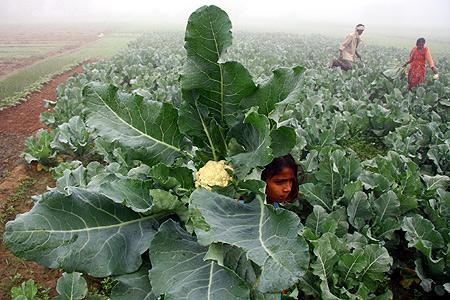
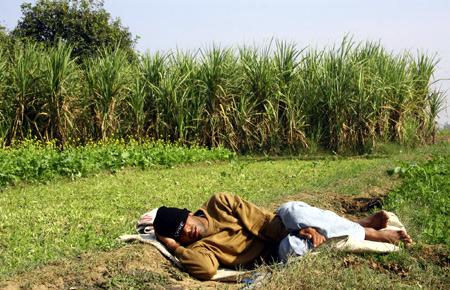
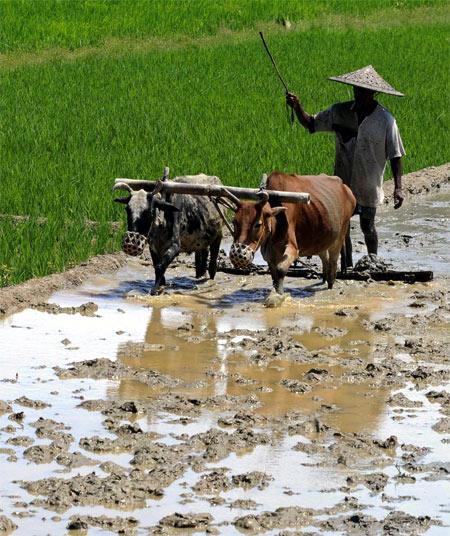
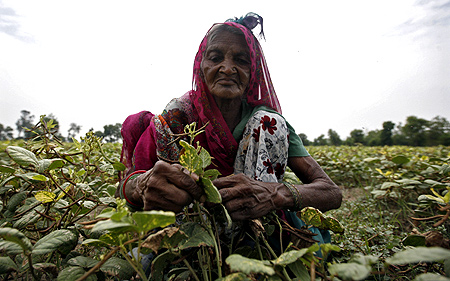
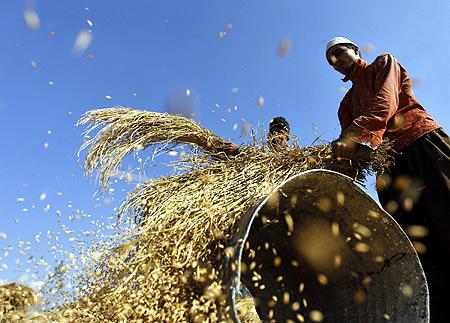
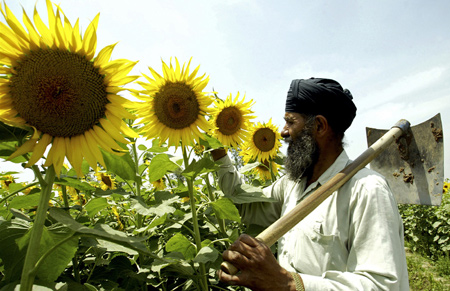
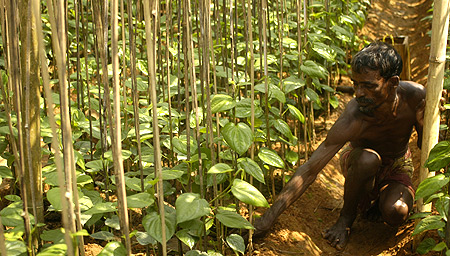
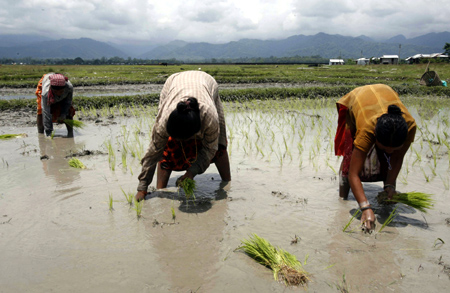
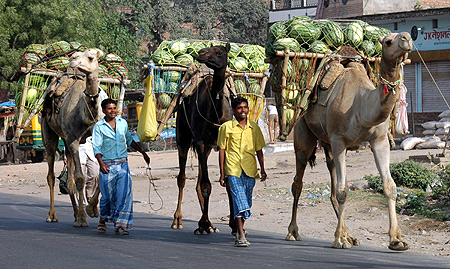
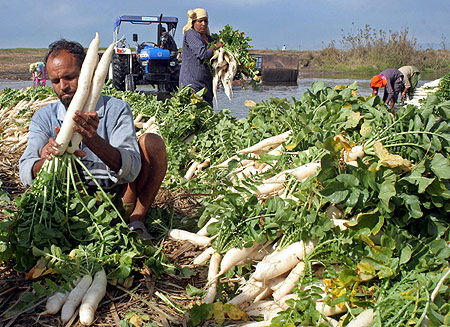

article